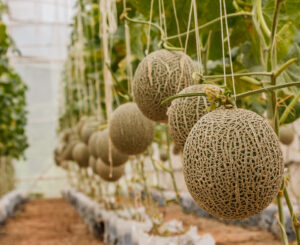A pot experiment with melon (Cucumis melo) cv. “Tempo F1” was conducted under greenhouse conditions in Mugla-Ortaca (Turkey). The plants were grown in a mixture of peat, perlite and sand (1:1:1) to investigate the effects of potassium nitrate applications to salinity-treated (150 mM) plants with respect to fruit yield, plant growth, some physiological parameters and ion uptake. All treatments received a standard nutrient solution. The volume of the nutrient solution applied to the root zone of the plants ranged from 200 to 500 ml per application, depending on plant age, applied twice a week. Treatments were: 1) control (C), 2) salinity treatment by addition of 150 mM NaCl (C+S) and 3) plants receiving 150 mM NaCl plus supplementary 5 mM KNO3 (C+S+PN). Each treatment was replicated three times and each replicate included 5 pots.
The salt treatment (150 mM NaCl) resulted in statistically significant decreases in plant growth, fruit yield and chlorophyll a content, accompanied by significant increases in electro leakage (membrane permeability). Supplementary KNO3 treatments significantly ameliorated the adverse effects of salinity on plant growth, fruit yield and the physiological parameters examined (Table 1). This could be attributed to the effects of all the external supplements in maintaining membrane permeability, increasing relative water content, stomatal density and concentrations of Ca2+, N and K+ in the leaves of plants subjected to salt stress. It can be concluded that potassium nitrate was effective in mitigating the adverse effects of salinity stress in melon plants.
Table 1: Effects of sodium chloride and potassium nitrate supplementation with a standard nutrient solution in melon.


